- Home
- Paul Finch
Stalkers Page 2
Stalkers Read online
Page 2
What she saw left her astounded: her front two tyres hung in shreds around their wheel-trims. It was the same with her rear tyres. They’d literally been ripped to pieces; spokes of broken ply-cord poked out from them. She walked around the vehicle in a circle, scarcely able to comprehend the misfortune of it. One blow-out would have been bad enough; she’d never changed a wheel before and thought she could probably do it, but here — in the middle of the woods, at this time of night? Not that it mattered now, because she didn’t have spares for all four of them.
She fumbled in her jacket pocket for her mobile phone. She’d have to call Alan. Okay, he was at the golf club and would probably have had too many drinks to drive, but there might be someone who could come and pick her up. If not, he’d know what to do.
Then Louise spotted something else.
The phone was now in her hand, but her finger froze on the keypad.
About forty yards behind the car, something glinted with moonlight as it lay across the road. She walked slowly towards it, but stopped when she was only halfway.
It was a ‘stinger’ — at least, that’s what she thought they were called. One of those retractable beds of nails that police use to stop getaway cars after bank robberies. Someone had deliberately left it across the road.
Louise realised that she was shaking. She backtracked towards the car. Had some hooligans done this, some idiotic bunch of kids who had no better way to waste their time? Or was it something more sinister? Not allowing herself to think about the latter option, and certainly not glancing into the unlit reaches of woodland on all sides, she scrambled back to the car and yanked open the driver’s door.
She paused briefly to consider: she couldn’t drive on her hubcaps of course. But she could lock herself in. Yes, that was what she’d do. She’d lock herself in and call for help. She climbed behind the wheel, closed the door and made to apply the locks when she sensed the presence, just to the left of her.
Slowly, she twisted around to look.
He was in the front passenger seat, having clearly climbed in while she’d been distracted by the stinger. He was of heavy build and wore dark clothing: a bulky leather jacket and underneath that a ‘hoodie’ top with the hood actually pulled back. His hair was thinning and he had a pair of huge, jug-handle ears. But he had no nose — just a gristle-filled cavity — and no eyelids, while the rest of his face was a patchwork of puffy, raddled scar tissue.
Louise tried to scream, but a thick hand in a leather glove slapped onto her mouth. A second hand, also gloved, fastened around her throat.
And began to squeeze.
Chapter 2
It was typical Bermondsey — scrap yards, wasteland, litter, graffiti running over everything.
Heck drove through it with a jaundiced eye, thinking only that his battered old Fiat Brava matched this decayed environment perfectly. To his left somewhere lay the river, delineated by the occasional crane or wharf-tower. He passed a row of boarded-up buildings on his right. A bag-lady sat on the kerb, her knees spread indecently wide as she drank from a bottle of cheap wine. Directly ahead, derelict tower blocks — bleak edifices of stained concrete and broken glass — were framed on the slate-grey sky.
He drove on, too weary to be oppressed by such a scene.
The appointed meeting-place turned out to be a crossroads close to a low railway arch. Corrugated steel fences hemmed it in from all sides and there was a single streetlight, its bulb long smashed. On the left, a mound of flattened brick rubble provided sufficient room for parking. However, Heck cruised on past, surveying the place carefully. There was nobody there, which, checking his watch — it was now ten minutes to six — was not surprising. He was early for the rendezvous, but at this hour on a Sunday morning there was unlikely to be anyone about in this desolate neck of the woods. He passed under the arch and drove another three hundred yards until a broken fence and a patch of scorched ground afforded him a turning-space. After that, driving slowly this time, he made his way back.
At the crossroads, another vehicle was now present. A maroon Bentley had parked, and a tall, lean man was standing against it, reading the Sunday Sport. He wore a black suit and had short hair bleached a shocking blonde. When Heck saw the car and the man, he groaned with disbelief. In truth, he hadn’t expected a great deal from this meeting. The voice on his office answering-machine had been abrupt and to the point, stating simply that it had information he might find useful. It had then given a time and place, and had rung off. When Heck had traced it, the call had been made from a payphone somewhere in South London. He’d received dozens of similar things over the last few months, but on this occasion, perhaps because he was so dog-tired, he’d started thinking irrationally; he’d wondered if maybe he’d get a break simply because he was due one.
Not so apparently. It was another false dawn.
He pulled up on the opposite side of the crossroads and climbed from his Fiat. He knew that he looked like shit: he was groggy with fatigue, sallow-faced, unshaven. His jacket and tie were rumpled, his shirt stained from drips of late-night coffee.
Heck idled across the road, hands in his trouser pockets. The tall, blond man, whose name was Dale Loxton, glanced up over his newspaper. This close, his otherwise smart appearance was belied by the ugly, jagged scar down his left cheek and the fanged snakehead tattoo on the side of his neck. He wore black leather gloves.
Heck sensed that another figure had appeared from a concealed position to his right. It was Lennie ‘the Loon’ Asquith: he was burly, almost ape-like. He too wore a black suit and black leather gloves, but he had long, greasy red hair and a brutal face pock-marked with acne scars. Neither of the men was smiling.
‘Regular double-act, you two, aren’t you?’ Heck said.
Loxton folded his paper. ‘Mr Ballamara would like a word with you.’
‘And I’d like to get home and find Jessica Alba making my breakfast wearing only an apron and high heels. What are the chances of that, do you reckon?’
‘It’s just a little chat,’ Loxton said, opening the Bentley’s rear off-side door.
Asquith had advanced until he was very close and now stood there like a rock, his big arms folded across his barrel chest. Heck knew he had no option. Not that he fancied it. Even ‘little chats’ with Bobby Ballamara had a habit of turning nasty.
He climbed in and Loxton closed the door behind him. The car’s interior was plush, all fragrant leather and varnished woodwork. Ballamara, as always, immaculate in a pinstriped suit with a shirt and tie of pink silk and a pink handkerchief peeking from his breast pocket, was engrossed in a copy of The Times. He was an elderly man, maybe sixty, rat-faced, with close-cropped white hair and a white, pencil-thin moustache. To all intents and purposes he looked like an ordinary businessman, until you saw his eyes; they were dead, flat, ice-grey in colour.
‘Ah,’ he said, in his only slightly noticeable Cockney accent. ‘Heck.’
‘My friends call me “Heck”. To you it’s “Detective Sergeant Heckenburg”.’
Ballamara smiled to himself and closed the newspaper.
‘What do you want?’ Heck asked.
‘How’s it going? You making any progress?’
Heck reached up to loosen his tie, only to find that it was already loose; it hung at his throat in a limp knot. ‘Do I look like I am?’
‘You’ve certainly been putting the hours in. There’s no question about that.’
‘Been keeping tabs on me, have you?’
‘Now and then. As a scrupulous tax-payer, I like to know my money’s being well-spent.’
Heck feigned surprise. ‘They tax drugs and prostitution now, do they?’
‘Let’s try and keep this friendly, Heckenburg.’
‘You asking me that, or telling me?’
Ballamara’s smile faded a little. ‘You know, these snappy comebacks may win you kudos with the secretaries in the CID office. But I’d remind you that my daughter has now been missing for two years.’
/>
‘And I’d remind you that a large number of other people’s daughters have been missing for a similar period of time, if not longer. And I’m no more personally answerable to them than I am to you.’
‘You still the only officer on the case?’
‘You know I can’t divulge information regarding an ongoing enquiry.’
Ballamara nodded thoughtfully. ‘Which means you are the only officer on the case. In the whole of the Metropolitan Police only one detective is working on my daughter’s disappearance.’
Heck sighed. He felt like they’d been over this ground umpteen times. ‘I’m not in the Metropolitan Police anymore, Mr Ballamara. I’m with the National Crime Group, as you well know. That means we have less manpower and we’re not only investigating crime in London, we’re investigating it in the whole of England and Wales. However, the point is a good one. So why don’t you lodge your complaint with Commander Laycock at New Scotland Yard? Believe me, I’d like nothing better. Now, if that’s all there is, I’ve been on a surveillance operation all night, I have about six hours of paperwork still to do, and after that I’m off to bed.’
He opened the door and made to climb out, but Asquith was standing on the other side, and slammed it closed again. Heck pulled back sharply, only just managing to avoid smashing his face on the window.
‘Heckenburg, there’s something you should know about me,’ Ballamara said. It was said casually; a simple statement. But the gang leader’s flat, grey eyes had now hardened until they were more like coins. ‘I have personally used the foundations of motorway bridges to bury coppers who were much tougher, much cleverer, and much, much higher up the food-chain than you. You think I’m just going to sit back and let some low-rank pipsqueak keep fobbing me off while my daughter is suffering God knows what?’
Heck rubbed his forehead. ‘I’m doing what I can.’
‘It isn’t enough.’
‘There’s no case, alright?’ Heck stared at him as earnestly as he could. ‘I’ve told you this before. Your Noreen went missing. I’m sorry about that, but she was nineteen and a big girl. She had money, she had her independence — she’s hardly what you’d class as a vulnerable person. You need to accept the possibility that she might have disappeared because she wanted to.’
‘She was out with her mates in the West End,’ Ballamara reminded him. ‘It was their usual Saturday night get-together. All she had with her was her handbag and the very skimpy clothes she was standing up in. The next day I searched her flat, myself. The wardrobes were still full. All her suitcases were there, her passport was in the fucking drawer, for Christ’s sake.’
Heck didn’t really know how to reply. They’d had this conversation over and over, and in any case the gangster was preaching to the converted. Heck also believed that Noreen Ballamara had fallen victim to foul play, and, in that respect, his toeing the ‘official’ line was becoming thankless and tiresome.
‘Look Ballamara,’ he finally said, ‘you need to understand …’
‘Mister Ballamara, while we’re insisting on formalities.’
‘Mr Ballamara, it’s not me you’ve got to convince. But with no body, no crime scene and basically no evidence of anything at all, I’m pissing in the wind. At present, all we can do is class Noreen as a missing person.’
‘And what about all the others?’
‘The same thing. There’s no proof that any of these disappearances are connected.’
‘You don’t think it’s a hell of a coincidence?’
‘Look at the bigger picture. Thousands of people drop out of sight every year, but only a fraction of them in suspicious circumstances.’
Ballamara nodded at this and smiled. ‘In which case, why are you, an officer in the NCG’s Serial Crimes Unit, looking into these particular forty cases?’
‘That’s what my gaffers are wondering.’
‘It isn’t good enough, Heckenburg. I want answers.’
‘What do you think I want?’
‘I don’t give a flying fuck what you want!’ The gangster leaned across and peered into Heck’s face with lupine intensity. He’d now blanched to a very unhealthy shade of white and was so close that his breath filled the cop’s nostrils with a reek of peppermint. When he spoke again, it was in a low, menacing monotone. ‘Now you listen, my son. I’ve had it up to here with this bullshit. So from now on, you aren’t just working for the police — you’re working for me. Consider the fact that you’re still walking around with an intact spine your salary. Now get out and get back on the job, or I’ll personally rearrange your face so your fucking mum wouldn’t recognise it.’
Right on cue, the car door opened again.
Heck found himself being helped out by Asquith, though, with a bunched fist gripping him by the back of his collar, it was the sort of help he probably didn’t need. The door closed with a thud, and then Heck was standing in the road watching as Asquith sidled around the vehicle to the front passenger door, and Loxton made to climb behind the steering wheel.
‘Don’t suppose you lot have been looking for Noreen, have you?’ Heck asked them.
Loxton eyed him as though he couldn’t believe a copper could ask so stupid a question. ‘Course we fucking have.’
‘Any leads you’d care to share?’
‘Dale!’ Ballamara shouted from inside the car. ‘Stop jawing with that fucking waste of space. He hasn’t got time for idle chat.’
Heck stood back as the Bentley swerved off the rubble and drove away in a cloud of dust and debris. In truth, there was any number of things he could have charged Bobby Ballamara with. That morning alone he was good for wasting police time, threatening to kill, unlawful imprisonment, and so on. But these were Mickey Mouse offences, arrests that would only distract from the main story, which was the thirty-eight missing women that Heck had been looking for since the beginning of 2010. What was more, Bobby Ballamara and his boys who, by their own admission, were keeping their ear to the ground, had a potentially useful role to play in this, so alienating them even further would be self-defeating. Besides, for all his bravado, Ballamara was unlikely to whack a copper. He was strictly old school. A vicious, violent racketeer, he wouldn’t hesitate to have a fellow lowlife’s brains beaten out of him if he felt like it. But his traditional gangland ethics made him seem anachronistic in this age of crazy, gun-toting killers who’d think nothing of massacring school-kids should they get in the way.
Heck walked back to his car, only to spot that its front nearside tyre was flat. For an angry moment he assumed that either Asquith or Loxton had got bored while he’d been in conversation with their boss. But then he saw the rusty nail sticking out of it, almost certainly picked up on the patch of burned ground that he’d used as a turning-space earlier. Irritated with his own carelessness, and feeling way too tired for the physical effort now required, he went to the boot for his spare.
That was when it began to rain.
Chapter 3
Each time Louise woke up it seemed like she was emerging from a horrific nightmare, only to discover that it was reality.
She was in the boot of a vehicle — she’d realised that much from the rumbling of the engine and the constant jolting and bumping. Her hands were secured behind her back in what felt like a pair of plastic cuffs, which were pulled so tight that they burned into her flesh. Her legs were crooked painfully beneath her because she couldn’t lie full-length in such an enclosed space. It was pitch-black and stiflingly hot; her clothes were damp with sweat, and yet her body was utterly frozen with terror. She didn’t know how long she’d been in here. It seemed like days, though surely it couldn’t have been that long — a day and a night maybe, possibly a little longer? Either way, she was parched with thirst, hunger was gnawing her insides out and the atmosphere was unspeakably foul as she’d urinated on herself at least twice. Yet none of that compared to the mind-numbing fear of what might lie ahead.
A piece of duct-tape had been smacked across her mouth and wrapped a
round the back of her head so she could barely whimper, let alone scream. A blindfold made of cloth was bound around her eyes. The memory of what had happened on the quiet country road was only vague. Whoever the man was who’d attacked her — if it had been a man (that diabolical face was still imprinted on her mind) — he’d choked her into unconsciousness. But at least that brief instant of agony and dread had been swift. She’d have swapped the merciful oblivion it brought for the prolonged, torturous ordeal that she was going through now. She’d been enclosed in this metal coffin for so long that she’d even slept once or twice, though that was mainly because each time when she’d woken she’d thrashed about frantically until she was exhausted. Louise struggled again, futilely, wailing beneath her gag. The problem was that the boot was claustropho-bically tight and confined; its lid was only a couple of inches above her, and she had no leverage with which to kick against it.
For the thousandth time, her thoughts raced chaotically as she tried to recall the contradictory advice she’d heard over the years about what a woman should do if she was attacked by a rapist. She was sure a police officer on television had said that you should fight, scratch, bite — but what if this antagonised the assailant? Someone else had said that you should plead with him, humanise yourself by talking about your family, your children. But again — what if he was a sadist, and that gave him even more pleasure?
Of course, at the end of the day all this was theory. It had never occurred to Louise that she might at some time be in a position to put such horrors to the test. Even now they barely seemed real. Some thirty-six hours later — it was at least that long, she decided, which made it sometime on Sunday morning — she was still numb with shock, still faint, still nauseated by fear. Fresh sweat seeped through her clothes as she pondered the many possibilities behind her abduction. Above all, Louise clung to the fact that she was still alive so many hours later. She hadn’t been raped yet, or beaten, or murdered. In addition, the car had stopped once — quite a few hours ago now, it seemed — the boot had opened, her gag had briefly been removed and someone who never spoke had forced a plastic straw between her lips, allowing her a few sips of water. Surely all this meant she was more to them than a mere plaything? It seemed increasingly likely that they needed her alive, though she hardly dared anticipate such. Alan was a wealthy guy and Goldstein amp; Hoff were major players on the international banking scene: obvious targets for ransom demands. In addition, her kidnapper had gone to great trouble to snare her in the first place: she hadn’t just been dragged into an alley. That slow pursuit all the way from the City, the stinger across the country road — clear evidence of deliberation, of forward planning. In some ways that made it even more frightening, but it also gave Louise hope that she was merely a pawn in a larger game. What game that might be, she had no clue; it wasn’t necessarily financial — heaven knew what the top brass in the City sometimes got involved with — but as long as this was not a personal attack against her surely she stood at least a reasonable chance of being released unharmed …?

 Stolen
Stolen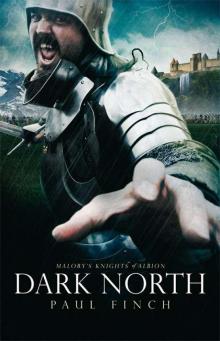 Dark North mkoa-3
Dark North mkoa-3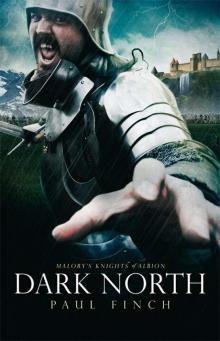 Dark North (Malory's Knights of Albion)
Dark North (Malory's Knights of Albion) a collection of horror short stories
a collection of horror short stories Sacrifice
Sacrifice Kiss of Death
Kiss of Death Medi-Evil 2
Medi-Evil 2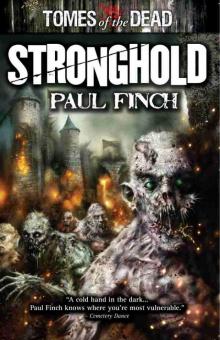 Stronghold
Stronghold Medi-Evil 3
Medi-Evil 3 Dead Man Walking
Dead Man Walking Strangers
Strangers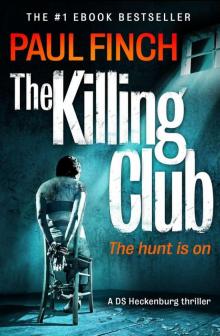 The Killing Club
The Killing Club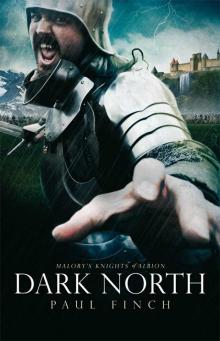 Dark North
Dark North A Wanted Man
A Wanted Man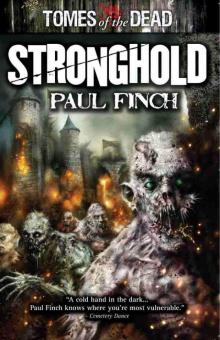 Stronghold (tomes of the dead)
Stronghold (tomes of the dead) Hunted
Hunted Cape Wrath
Cape Wrath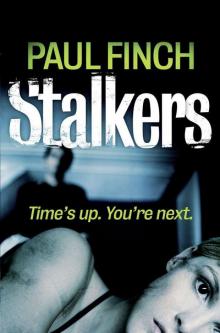 Stalkers
Stalkers The Burning Man
The Burning Man Medi-Evil 1
Medi-Evil 1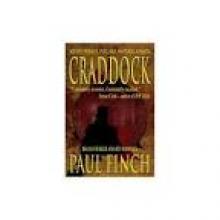 Craddock
Craddock Hunted (Detective Mark Heckenburg Book 5)
Hunted (Detective Mark Heckenburg Book 5)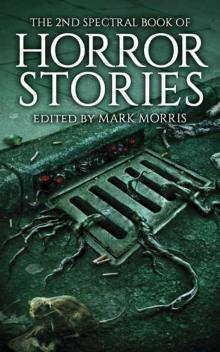 2nd Spectral Book of Horror Stories
2nd Spectral Book of Horror Stories The Chase
The Chase